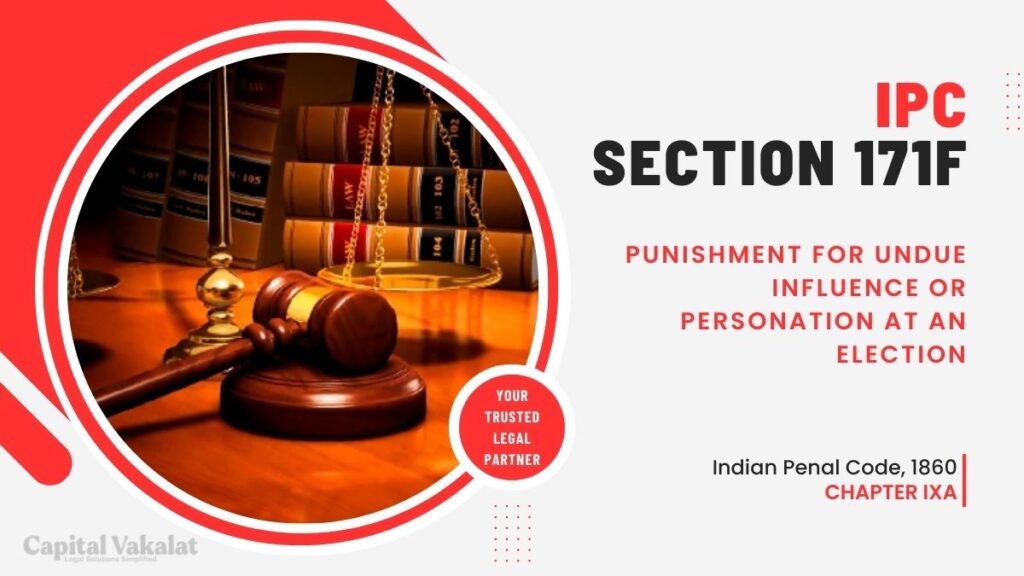Elections are the cornerstone of any democratic society, allowing citizens to express their preferences and choose their representatives. To ensure the integrity of the electoral process, Indian law has provisions that penalize activities that undermine the free and fair conduct of elections. One such provision is Section 171F of the Indian Penal Code (IPC), which deals with punishment for undue influence or personation at an election.

In this article, we will delve into the nuances of Section 171F IPC, examining its various aspects, implications, and significance.
Understanding Section 171F of IPC
Definition of Undue Influence
Undue influence, as defined under Section 171F of the IPC, refers to any act, offer, or promise made with the intent to influence a voter’s choice. This influence may be exerted through any means, whether by the use of force, coercion, or bribery. It is crucial to understand that the essence of democracy lies in an individual’s ability to vote freely, without external pressures.
Definition of Personation
Personation, in the context of elections, is the act of impersonating another voter with the intention to cast a vote on their behalf. This fraudulent practice undermines the principle of ‘one person, one vote’ and is a grave offense under Section 171F IPC.
Offenses under Section 171F IPC
Section 171F of the IPC categorically defines two distinct offenses:
- Undue Influence: This offense occurs when an individual attempts to influence a voter through means such as threats, bribes, or any other unlawful inducements.
- Personation: Personation happens when someone impersonates another voter, either by assuming their identity or using fraudulent means to cast a vote on their behalf.
Punishments and Consequences
Imprisonment
Section 171F IPC prescribes stringent penalties for those found guilty of undue influence or personation. Offenders may face imprisonment for a term which may extend to one year or a fine, or both.
Fine
In addition to imprisonment, a fine may be imposed on the convicted individuals. The amount of the fine is determined by the court and may vary depending on the severity of the offense.
Cases and Precedents
Over the years, numerous cases have been reported where individuals have been prosecuted under Section 171F IPC. These cases serve as a precedent, emphasizing the Indian judiciary’s commitment to upholding the sanctity of elections and punishing those who seek to subvert the democratic process.
Significance of Section 171F IPC
Section 171F IPC plays a pivotal role in ensuring the fairness of elections. It acts as a deterrent, sending a clear message that attempts to unduly influence voters or engage in personation will not go unpunished. By upholding the law, elections can truly represent the will of the people.
Legal Provisions and Amendments
Indian law is dynamic, and amendments are made to existing statutes to address evolving challenges in the electoral process. It’s essential to stay updated with any changes in the legal framework to understand the implications for those involved in elections.
Election Commission’s Role
The Election Commission of India is responsible for overseeing the electoral process in the country. It plays a crucial role in ensuring that elections are conducted impartially and that the provisions of Section 171F IPC are enforced effectively.
Preventive Measures
Preventing undue influence and personation starts with awareness. Voters should be educated about their rights and the consequences of engaging in such practices. Political parties and candidates should also promote ethical conduct during elections.
Reporting Violations
If you witness or are aware of any violations of Section 171F IPC during an election, it is your civic duty to report them to the relevant authorities. Reporting such violations is an essential step in preserving the integrity of the electoral process.
Conclusion
Section 171F of the Indian Penal Code is a vital legal provision aimed at maintaining the integrity of elections in India. It sends a clear message that the misuse of influence and personation is unacceptable and punishable. Upholding the principles of democracy and the right to free and fair elections is essential for a thriving nation.
Frequently Asked Questions
What is personation in the context of elections?
Personation refers to the act of impersonating another voter to cast a vote on their behalf.
Why is Section 171F IPC important in elections?
It ensures that elections are conducted fairly and that attempts to unduly influence voters or engage in personation are penalized.
How can I report violations of Section 171F IPC during an election?
You can report violations to the relevant authorities responsible for overseeing elections.
What role does the Election Commission of India play in upholding Section 171F IPC?
The Election Commission is responsible for overseeing the electoral process and ensuring that the law is enforced effectively.